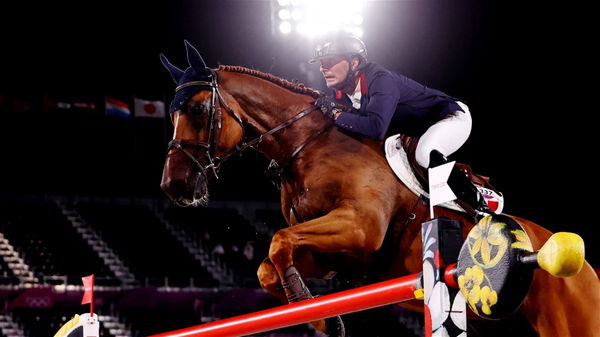As Road to Paris 2024 Nears, Does Equestrian Sport Need to Jump off the Doping Bandwagon?

Follow Us

Doping stands as a primary threat to the integrity of sports, dismissing the spirit of fair play. The practice in prevalence, to gain a competitive edge among athletes distorts perspectives and efforts held by those on the other side. While the risk inflicted upon human-centric sports is no news, its potential concern in equestrian sports has presented the authorities with a circumstance to revisit the regulations on the road to Paris 2024.
The road to Paris 2024 and beyond marks a highlight for many athletes’ careers; thus demanding a tireless effort to get through. The measures embraced to walk the path, raise questions influential on equestrian sports. With IOC’s recent regulations to uphold the values, will the event present a clean marking for the athletes, both animal and human ahead?
Regulations in place for athletes on the road to Paris 2024
ADVERTISEMENT
Article continues below this ad
The sporting industry has witnessed numerous infamous doping scandals in recent years. The case of Kamila Valieva which took center stage the past week, has made waves in figure skating and beyond. But most importantly it has brought out the athletes’ response to the grueling impact it can bore. “Truth was ridiculed, and silence fell upon our dreams like the foggy morning after a storm, I had begun to lose hope,” figure skater Vincent Zhou remarked. In the wake of the same, and more, the World Anti-Doping Agency (WADA) has shared the IOC’s anti-doping rules for Paris 2024.

“During the period of the Olympic Games Paris 2024, all athletes shall be subject to doping controls initiated by the International Testing Agency (ITA) at any time or place, with no advance notice required to be given to the athletes,” the IOC letter read. This time, however, the regulations will extend to not just athletes but officials involved in the organization. Furthermore, in accordance with FEI rules, horses, who have been subject to doping previously, will also be tested under the regulation.
Cases of doping in equestrian
Though not significant, equestrian sports have often faced the challenges of doping cases. In one of the documented cases of 2015, the French eventing team lost its Olympic berth when one of their horses tested positive for a banned substance. The same year, Swiss rider and Olympic medalist, Steve Guerdat fought suspension when one of his horses tested positive for the same. However, it was lifted due to complications specific to the industry (mentioned later).
For a rather firm case of late, the Australian show jumping team was disqualified from the Tokyo Olympics in 2020 just weeks ahead of the event. Equestrian Jamie Kermond had tested positive for a metabolite of cocaine. “I am extremely upset and remorseful as to what has happened and I accept full responsibility. I am truly sorry as I have let a lot of people down including my family and teammates,” Kermond commented. The very next year, a similar same repeated with Dutch equestrian, Bart Bles. The cases present varied instances and the need for a keen eye to ensure a fair path further as a cooperation between FEI and WADA.
Governing bodies’ take on complications on road to Paris 2024
Doping in equestrian sports poses a different challenge compared to the rest. The banned substances in the field include not only performance-enhancing substances but also that of legitimate medications. A wrong take can threaten animal welfare and wrongful claims of the acts in question. The organizations thus strive to find a balance between welfare and the integrity of the sport. Furthermore, the parties involved in the practice of doping may not always present a clear picture. Thus, the USEF has reformed its rules to hold the rider, owner of the horse, and support personnel responsible in case the equine tests positive.
Also Read: US Equestrian Anna Buffini Reflects on ‘Life Changed Forever’ After Guenter Seidel’s Mentorship
ADVERTISEMENT
Article continues below this ad
On a larger scale, the FEI covers the sport on a global level, working with WADA. The organization extends its regulations to human athletes under FEI Anti-doping Rules that are adopted from the WADA code. Prohibited Substances/Methods, Specified Substances/Methods, and Substances of Abuse fall under the various categories framed by the authorities.
Equestrian and Olympics
These regulations combined with the IOC framework on the road to Paris, offer a fair ground for equestrian sports to stand out of unjust territory. Moreover, apart from national qualification grounds, the past 3 Olympic games have recorded negative results of both human and animal athletes. “For now, this result validates all the work that has gone into the FEI clean sport educational campaign over the years, the buy-in of our national federations and the uptake of equine pre-arrival testing and elective testing to ensure our horses would compete clean at the Games,” FEI president, Ingmar De Vos.
ADVERTISEMENT
Article continues below this ad
Learning the takeaways, De Vos stated that the federation would carry on the learnings to Paris 2024. With agreeable results, the sport is on its way to fetch clean sport on the road to Paris 2024 and beyond.
Watch this story: Hollywood Fame Mark Wahlberg’s Equestrian Daughter Drops Her Own Movie
Edited by:

Sampurna Pal

